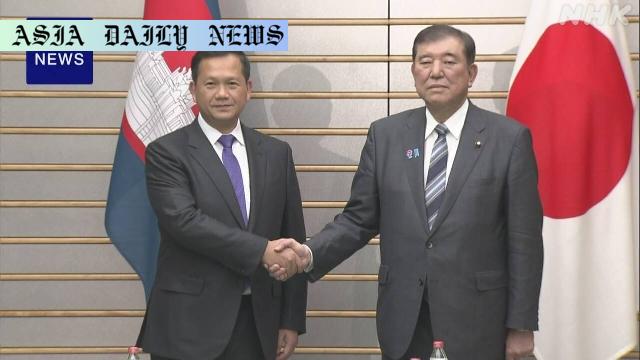Cross-border crime: Japanese and Cambodian PMs join forces to boost cooperation on economic and security ties, and combat cross-border crime.
Key Point 1: Japanese and Cambodian PMs agreed to address cross-border crimes like phone scams.
Key Point 2: The leaders emphasized strengthening economic, security, and trade ties.
Key Point 3: Recent arrests in Cambodia include 30 people, including Japanese nationals, linked to scams.
Key Point 4: Closer cooperation was underscored to achieve global peace and stability.

Japanese and Cambodian Leaders Unite Against Cross-Border Crime
On Friday in Tokyo, Japanese Prime Minister Ishiba Shigeru and Cambodian Prime Minister Hun Manet convened to discuss and implement measures to fortify their nations’ cooperative ties. With the world’s geopolitical climate becoming increasingly unpredictable, the two leaders emphasized the need for robust economic and security frameworks to counter modern challenges. Cross-border crime, including online and phone scams, was identified as a significant area of concern, driving the discussion toward a unified strategy for prevention and enforcement.
Prime Minister Ishiba lauded Cambodia as a crucial partner for Japan, underscoring the significance of collaborative efforts amid global instability. Recognizing mutual dependence, Cambodia’s Prime Minister Hun Manet expressed appreciation for Japan’s developmental support over the years. Pledging to amplify bilateral ties, both leaders agreed to forge stronger economic and security bonds while fostering a trading environment based on free-market principles.
Joint Efforts to Tackle Cross-Border Crime
In addressing cross-border crime, Japan and Cambodia outlined specific actions to combat phone scams and online fraud. Recent reports reveal that Cambodian authorities apprehended approximately 30 individuals, including Japanese nationals, accused of participating in scam operations. This highlights the urgent necessity for collaborative policing initiatives and international cooperation in enforcing the law.
The agreement includes bilateral training sessions and the exchange of specialized knowledge between Japanese and Cambodian police forces. The ultimate aim is not only to penalize offenders but also to safeguard citizens from falling victim to fraudulent schemes. By pooling resources and intelligence, the two nations signal their commitment to tackling shared challenges effectively.
A Vision for Economic Stability and Global Peace
The meeting didn’t merely focus on crime. The dialogue extended to promote a free trading system and an interconnected global economy. Both Prime Ministers recognized the symbiotic relationship between a robust economy and secure governance. Prime Minister Ishiba reiterated Japan’s resolve to assist Cambodia in its pursuit of sustainable development, fostering an environment conducive to innovation and prosperity.
This partnership also seeks to address regional geopolitical issues and ensure stability in Southeast Asia and beyond. By prioritizing free trade and mutual economic growth, Japan and Cambodia are paving the path toward a stable and peaceful future, setting an example for other nations to follow.
Conclusion: Unification Against Challenges
The historic meeting between Prime Ministers Ishiba Shigeru and Hun Manet emphasized the significance of strong alliances in turbulent times. From addressing the challenges of cross-border crime to building an environment of economic collaboration and security, the decisions made in Tokyo represent a milestone for Japanese-Cambodian relations. As these two nations move forward, their partnership reflects a unified front against the ever-evolving challenges of the modern world, reminding us all of the power of cooperation.



Commentary
The Importance of International Cooperation in Addressing Cross-Border Crime
The recent collaboration between Japanese Prime Minister Ishiba Shigeru and Cambodian Prime Minister Hun Manet demonstrates the indispensable role of international cooperation in tackling shared issues like cross-border crime. As globalization deepens, crimes such as phone scams and online fraud know no boundaries, making it essential for nations to join forces to combat such threats. By leveraging their strengths and fostering a mutually beneficial relationship, Japan and Cambodia exemplify how cross-border diplomacy can contribute to domestic and international stability.
Highlighting the Role of Economic and Security Ties
Economic stability often acts as the bedrock for a secure society. This truth resonates deeply in the leaders’ agreement to foster free trade and economic collaboration while tackling security concerns. As Japan extends its support to Cambodia for its sustainable development, it is important to observe how such alliances influence regional stability. These cooperative measures don’t merely improve GDPs but lay the groundwork for innovation, workforce empowerment, and criminal deterrence—fostering a self-reliant and prosperous landscape for future generations.
The Global Message Encased in Bilateral Action
The agreement reached in Tokyo is more than a bilateral pact; it sends a message of unity against global challenges. When two vastly different countries like Japan and Cambodia unite to tackle shared issues, it reinforces the idea that diversity can be turned into collective strength. In an unpredictable global milieu, such partnerships underscore the value of diplomacy, collaboration, and shared purpose, paving the way for a more resilient and peaceful world.
Ultimately, this meeting symbolizes a beacon of hope for how governments should respond to the complexities of globalization. It serves as a model, urging nations around the world to prioritize cooperation, adaptability, and shared growth as key strategies for addressing global challenges.